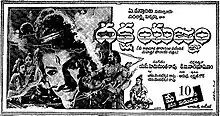Dakshayagnam (1962 film)
Dakshayagnam is a 1962 Indian Telugu-language Hindu mythological film, produced and directed by Kadaru Nagabhushanam under the Varalakshmi Pictures banner. It stars S. V. Ranga Rao, Devika, and N. T. Rama Rao,[1] with music composed by Saluri Hanumantha Rao. This was N. T. Rama Rao's 100th film which was also dubbed in Tamil with the same title.
| Dakshayagnam | |
|---|---|
 Theatrical release poster | |
| Telugu | దక్షయజ్ఞం |
| Directed by | Kadaru Nagabhushanam |
| Produced by | Kadaru Nagabhushanam Kannamba (Presents) |
| Written by | Aarudhra (dialogues) |
| Starring | S. V. Ranga Rao Devika N. T. Rama Rao |
| Music by | Saluri Hanumantha Rao |
| Cinematography | Lakshman Ghore |
| Edited by | N. K. Gopal |
Production company | Varalakshmi Pictures |
Release date |
|
Running time | 157 mins |
| Country | India |
| Language | Telugu |
Plot
The film begins with Daksha Prajapathi (S. V. Ranga Rao) becoming the king of the Prajapathis, all the gods give him the most effective powers and an oath that no one will cross his words. After that, he is blessed with 2 sons and also adopts 27 girls. Soon after, Adi Parashakti was born as his daughter Sathi (Devika), who is the greatest devotee of Lord Shiva (N. T. Rama Rao). Daksha performs his 27 daughters' marriage with Lord Chandra (Rama Krishna). After the marriage, Chandra spends most of his time with Rohini (Rajasri) and ignores the others when it was brought to Daksha's notice he curses Chandra to die out of T.B. disease. Here Chandra prays to Lord Shiva, then he gives a boon to protect him. Enraged Daksha clashes with Shiva and the war erupts. Lord Vishnu intervenes and makes a compromise by making Chandra into two. Daksha, however, maintains his grudge against Lord Shiva; when he learns his daughter Sathi is in love with Shiva. To prevent, eventually, he seeks alliance for his daughter. But Sathi marries Shiva against her father's wish, so, Daksha decides to insult Shiva by performing a sacrifice without inviting Shiva. Sathi wants to attend the sacrifice and visits uninvitedly ignoring the advice of her husband where she has to endure many insults. At last, when Daksha started insulting her husband, she could not bear and immolated herself in the sacrificial fire. Hearing it, Lord Shiva makes a ferocious dance called Rudra Thandava and wakes up Veerabhadra from his hair, who destroys sacrifice and decapitates Daksha. At last, on request of Daksha's wife Vairini (Kannamba) Shiva forgives Daksha and brings him back to life giving him a goat's head instead of his own. The place where Lord Siva blessed Sarangadhara a temple adored been by the name Draksharama temple near Rajamandry till today.
Cast
- S. V. Ranga Rao as Daksha
- Devika as Sati Devi
- N. T. Rama Rao as Lord Shiva
- Kannamba as Vairini
- Chittor V. Nagaiah as Dadhichi Maharshi
- Rajanala as Indra
- Ramakrishna as Chandra
- Mikkilineni as Lord Brahma
- Padmanabham as Daksha's Younger son
- Suri Babu as Nandi
- Raghuramaiah as Narada Maharshi
- Balakrishna as Daksha's Elder son
- Dr. Sivaramakrishnaiah
- Rajasree as Rohini
- Chayadevi
- Meena Kumari
- Vasanthi
- Ambika Sukumaran as urvasi
Soundtrack
| Dakshayagnam | |
|---|---|
| Film score by | |
| Released | 1962 |
| Genre | Soundtrack |
| Length | 53:13 |
| Producer | Saluri Hanumantha Rao |
Music composed by Saluri Hanumantha Rao. Lyrics were written by Aarudhra.[2]
| S.No | Song Title | Singers | length |
|---|---|---|---|
| 1 | Namo Namo Nadaraja | Madhavapeddi Satyam | 4:50 |
| 2 | Jabilli Ohoho Jabilli | P. B. Srinivas, Jamuna Rani | 3:08 |
| 3 | Hara Hara Mahadeva | P. Suri Babu | 4:06 |
| 4 | Koyila Thelupavate | P. Susheela | 3:38 |
| 5 | Idhi Chakkani Lokam | P. B. Srinivas, S. Janaki | 3:33 |
| 6 | Nee Pada Samseva | P. Leela | 3:02 |
| 7 | Kaanaru Nee Mahima | Raghuramaiah | 2:56 |
| 8 | Emi Seyudu Devadeva | P. Leela | 3:20 |
| 9 | Karunaamoorthulu | Raghuramaiah | 1:34 |
| 10 | Navarasa Bhavala | P. Leela, Radha Jayalakshmi | 5:33 |
| 11 | Pasuvaa | Madhavapeddi Satyam | 1:00 |
| 12 | Kamaneeyam Kailasam | P. Susheela | 2:56 |
| 13 | Girija Kalyanam | P. Suribabu, Madhavapeddi Satyam, Raghuramaiah, P. Susheela | 13:15 |
| 14 | Mangalam Mahaniya Teja | M. Mallikarjuna Rao Bhagavathar | 0:22 |
References
- Radhakrishna (18 May 1962). "చిత్రసమీక్ష: దక్షయజ్ఞం" [Film Review: Dakshayagnam]. Andhra Prabha (in Telugu). Vijayawada. p. 6. Archived from the original on 14 November 2020.
- "Daksha Yagnyam (1962)-Song_Booklet". Indiancine.ma. Retrieved 23 January 2021.
